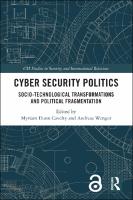Cyber Security Politics
Proposal review
Socio-Technological Transformations and Political Fragmentation
Contributor(s)
Dunn Cavelty, Myriam (editor)
Wenger, Andreas (editor)
Language
EnglishAbstract
This book examines new and challenging political aspects of cyber security and presents it as an issue defined by socio-technological uncertainty and political fragmentation. Structured along two broad themes and providing empirical examples for how socio-technical changes and political responses interact, the first part of the book looks at the current use of cyber space in conflictual settings, while the second focuses on political responses by state and non-state actors in an environment defined by uncertainties. Within this, it highlights four key debates that encapsulate the complexities and paradoxes of cyber security politics from a Western perspective – how much political influence states can achieve via cyber operations and what context factors condition the (limited) strategic utility of such operations; the role of emerging digital technologies and how the dynamics of the tech innovation process reinforce the fragmentation of the governance space; how states attempt to uphold stability in cyberspace and, more generally, in their strategic relations; and how the shared responsibility of state, economy, and society for cyber security continues to be re-negotiated in an increasingly trans-sectoral and transnational governance space. This book will be of much interest to students of cyber security, global governance, technology studies, and international relations.
Keywords
artificial intelligence; cyber-security; machine learning; socio-economic dynamics; socio-technical developmentsDOI
10.4324/9781003110224ISBN
9781000567113, 9780367626747, 9780367626648, 9781003110224, 9781000567113Publisher
Taylor & FrancisPublisher website
https://taylorandfrancis.com/Publication date and place
2022Imprint
RoutledgeSeries
CSS Studies in Security and International Relations,Classification
Warfare and defence
International relations
Espionage and secret services
Police and security services
Digital Lifestyle and online world: consumer and user guides


 Download
Download